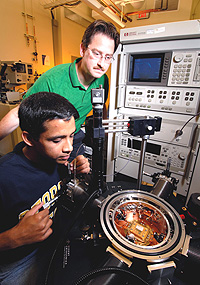
| Home | About Us | Contact Us | Contribute | Advertising | Subscribe for Free NOW! |
| News Archive | Features | Events | Recruitment | Directory |
News
21 June 2006
SiGe HBT sets new record above 500 GHz
A research team from IBM and the Georgia Institute of Technology has demonstrated the first silicon-germanium (SiGe) heterojunction bipolar transistor (HBT) to operate at frequencies above 500 GHz. The performance was achieved at extremely low temperatures, but if it can be replicated at higher temperatures, the HBTs have the potential to be used in communications systems, defense systems, remote sensing systems and space electronics. Currently, such applications rely on III/V-based transistors for the required frequancies. However, compared to III/V materials, SiGe is less costly to manufacture, making it more commercially attractive.
"For the first time, Georgia Tech and IBM have demonstrated that speeds of half a trillion cycles per second can be achieved in a commercial silicon-based technology, using large wafers and silicon-compatible low-cost manufacturing techniques,” said John D. Cressler, Byers Professor in Georgia Tech’s School of Electrical and Computer Engineering, and a researcher in the Georgia Electronic Design Center (GEDC) at Georgia Tech. “This work redefines the upper bounds of what is possible using silicon-germanium nanotechnology techniques.”
 At room temperature, the HBT operated at approximately 350 GHz, as compared with 500 GHz and above at a temperature of 4.5 Kelvins. According to the researchers, the next step is to understand the physics of SiGe devices at low temperatures.
At room temperature, the HBT operated at approximately 350 GHz, as compared with 500 GHz and above at a temperature of 4.5 Kelvins. According to the researchers, the next step is to understand the physics of SiGe devices at low temperatures.
Picture: Professor John Cressler and Phd student Ram Krithivasan examine a SiGe chip inside a cryogenic test station.
"We observe effects in these devices at cryogenic temperatures which potentially make them faster than simple theory would suggest, and may allow us to ultimately make the devices even faster,” said Cressler. “Understanding the basic physics of these advanced transistors arms us with knowledge that could make the next generation of silicon-based integrated circuits even better.”
The research team also included Georgia Tech Ph.D. students Ramkumar Krithivasan and Yuan Lu; Jae-Sun Rieh of Korea University in Seoul, South Korea (formerly with IBM); and Marwan Khater, David Ahlgren and Greg Freeman of IBM Microelectronics in East Fishkill, N.Y.
Visit: http://www.gatech.edu
